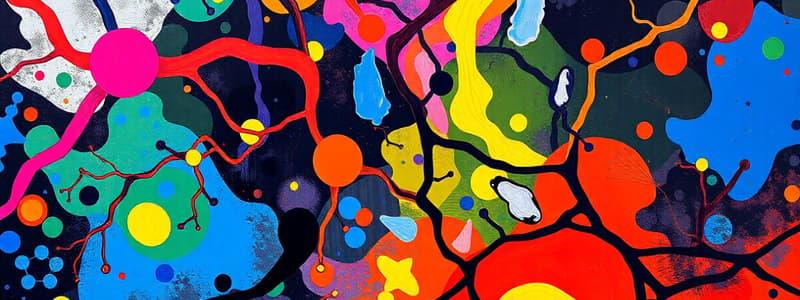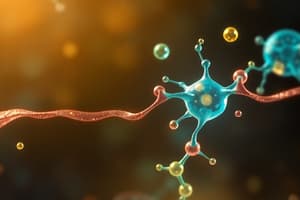Podcast
Questions and Answers
What type of adrenergic agonist is Clonidine classified as?
What type of adrenergic agonist is Clonidine classified as?
- Mixed-action agonist
- α-2 agonist (correct)
- β-2 agonist
- α-1 agonist
Which of the following is NOT a characteristic of catecholamines?
Which of the following is NOT a characteristic of catecholamines?
- Ineffective when taken orally
- Can cross the blood-brain barrier (correct)
- Short half-life due to rapid elimination
- Rapidly inactivated by MAO and COMT
Adrenaline primarily has which type of action?
Adrenaline primarily has which type of action?
- Selective β-2 action
- Potent non-selective action on both α and β receptors (correct)
- Only β-1 action
- Selective α-1 action
Which of the following drugs is classified as a β-1 agonist?
Which of the following drugs is classified as a β-1 agonist?
What is the primary characteristic of mixed-action agonists?
What is the primary characteristic of mixed-action agonists?
What distinguishes indirect-acting sympathetics from direct-acting ones?
What distinguishes indirect-acting sympathetics from direct-acting ones?
Which sympathomimetic drug is known for causing relaxation of bronchial smooth muscle?
Which sympathomimetic drug is known for causing relaxation of bronchial smooth muscle?
Which of the following routes of administration is NOT typically used for catecholamines?
Which of the following routes of administration is NOT typically used for catecholamines?
What is the primary function of catecholamine reuptake via neuronal transporters?
What is the primary function of catecholamine reuptake via neuronal transporters?
Which enzyme is responsible for the metabolism of noradrenaline and serotonin?
Which enzyme is responsible for the metabolism of noradrenaline and serotonin?
What therapeutic effect do MAO inhibitors provide when used as antidepressants?
What therapeutic effect do MAO inhibitors provide when used as antidepressants?
Which type of adrenergic receptor is primarily involved in the vasoconstriction effect mediated by noradrenaline?
Which type of adrenergic receptor is primarily involved in the vasoconstriction effect mediated by noradrenaline?
Which of the following adrenergic receptors is found in adipose tissue?
Which of the following adrenergic receptors is found in adipose tissue?
How does noradrenaline act on presynaptic α2 receptors?
How does noradrenaline act on presynaptic α2 receptors?
Which statement best describes the potency of isoprenaline, adrenaline, and noradrenaline at beta adrenergic receptors?
Which statement best describes the potency of isoprenaline, adrenaline, and noradrenaline at beta adrenergic receptors?
What is one of the main effects of noradrenaline on adrenergic receptors in the gastrointestinal tract?
What is one of the main effects of noradrenaline on adrenergic receptors in the gastrointestinal tract?
What is primarily affected by adrenaline at low doses?
What is primarily affected by adrenaline at low doses?
Which pharmacological effect is associated with high doses of noradrenaline?
Which pharmacological effect is associated with high doses of noradrenaline?
What is a common adverse drug reaction (ADR) of adrenaline?
What is a common adverse drug reaction (ADR) of adrenaline?
In which condition is adrenaline NOT typically utilized therapeutically?
In which condition is adrenaline NOT typically utilized therapeutically?
What is the primary route of administration for noradrenaline due to its properties?
What is the primary route of administration for noradrenaline due to its properties?
What is a significant pharmacological effect of adrenaline on blood pressure?
What is a significant pharmacological effect of adrenaline on blood pressure?
Which of the following consequences can arise from high doses of noradrenaline?
Which of the following consequences can arise from high doses of noradrenaline?
What effect does adrenaline have on smooth muscle in pregnant vs. non-pregnant women?
What effect does adrenaline have on smooth muscle in pregnant vs. non-pregnant women?
Which of the following is NOT a pharmacological action of the banned drug?
Which of the following is NOT a pharmacological action of the banned drug?
What therapeutic application is indicated for the use of adrenaline?
What therapeutic application is indicated for the use of adrenaline?
Which of the following β2-receptor agonists is used for asthma treatment?
Which of the following β2-receptor agonists is used for asthma treatment?
Which of the following is an application of α2 agonists like clonidine?
Which of the following is an application of α2 agonists like clonidine?
What is a common adverse drug reaction (ADR) associated with the banned drug?
What is a common adverse drug reaction (ADR) associated with the banned drug?
Which of the following nasal decongestants primarily causes rebound vasodilation when used topically?
Which of the following nasal decongestants primarily causes rebound vasodilation when used topically?
What is the primary action of Phenylephrine when administered as a nasal decongestant?
What is the primary action of Phenylephrine when administered as a nasal decongestant?
Which α1 agonist is synthetic and specifically direct in its mechanism of action?
Which α1 agonist is synthetic and specifically direct in its mechanism of action?
Which drug is utilized in the treatment of hypotensive states such as hypovolaemic shock?
Which drug is utilized in the treatment of hypotensive states such as hypovolaemic shock?
Which of the following drugs is associated with the treatment of alcohol withdrawal symptoms?
Which of the following drugs is associated with the treatment of alcohol withdrawal symptoms?
What is a notable adverse drug reaction (ADR) associated with Phenylephrine?
What is a notable adverse drug reaction (ADR) associated with Phenylephrine?
Which type of receptors does Clonidine primarily act upon in the brain to exert its effects?
Which type of receptors does Clonidine primarily act upon in the brain to exert its effects?
Which of the following drugs is known to be a poor bronchodilator and is often combined with other medications?
Which of the following drugs is known to be a poor bronchodilator and is often combined with other medications?
Flashcards are hidden until you start studying
Study Notes
Catecholamine Synthesis
- Catecholamines are neurotransmitters synthesized from the amino acid tyrosine.
- The synthesis pathway involves several enzymes: tyrosine hydroxylase, dopa decarboxylase, dopamine beta-hydroxylase, and phenylethanolamine N-methyltransferase (PNMT).
- The main catecholamines are dopamine, norepinephrine, and epinephrine.
Reuptake and Inactivation of Catecholamines
- Neuronal Reuptake: Catecholamines are reabsorbed back into the presynaptic neuron via specialized transporters called catecholamine reuptake transporters (NETs).
- Extraneuronal Reuptake: Catecholamines can also be taken up by adjacent cells, contributing to the regulation of catecholamine concentrations in the synaptic space.
Catecholamine Metabolism
- Monoamine Oxidase (MAO): Enzyme responsible for the breakdown of catecholamines in the presynaptic neuron.
- MAO inhibitors: Drugs that block MAO activity and lead to increased levels of catecholamines. Used as antidepressants.
- MAO-A: preferentially metabolizes norepinephrine and serotonin.
- MAO-B: preferentially metabolizes dopamine.
- Catechol-O-Methyl-Transferase (COMT): Enzyme responsible for the methylation of catecholamines. This methylation step inactivates catecholamine activity.
Adrenergic Receptors
- Adrenergic receptors are G protein-coupled receptors that bind catecholamines to initiate cellular responses.
- They are divided into α and β subtypes:
- α1: found in smooth muscles of blood vessels, bronchi, gastrointestinal tract, uterus, and bladder.
- α2: primarily located on presynaptic nerve terminals.
- β1: found in the heart, intestinal sphincter.
- β2: found in smooth muscle of blood vessels, bronchial smooth muscle, and adipose tissue.
- β3: found in adipose tissue.
Adrenoceptor Agonist Potencies
- Alpha agonists: Norepinephrine > epinephrine > isoproterenol
- Beta agonists: Isoproterenol > epinephrine > norepinephrine
Effects of Norepinephrine on Adrenergic Receptors
- α1: Vasoconstriction, relaxation of gastrointestinal smooth muscle, salivary secretion, and hepatic glycogenolysis.
- α2: Inhibition of norepinephrine release, promotion of platelet aggregation, vascular smooth muscle contraction, and insulin release.
- β1: Increased cardiac rate and force.
- β2: Bronchodilation, vasodilation, relaxation of visceral smooth muscle, hepatic glycogenolysis, and muscle tremor.
- β3: Lipolysis and thermogenesis, bladder detrusor muscle relaxation.
Sympathomimetic Drugs
- Drugs that mimic the effects of the sympathetic nervous system by activating adrenergic receptors.
- They are divided into several categories:
- Catecholamines: Directly-acting agonists.
- α agonists: Selective for α1 or α2 receptors.
- β agonists: Selective for β1 or β2 receptors.
- Mixed-action agonists: Act on both α and β receptors.
Catecholamine Drugs
- Epinephrine (Adrenaline): Non-selective adrenergic agonist with both α and β activity.
- Pharmacological effects:
- Cardiocirculatory: Heart rate increase, force of contraction, systolic volume, vasoconstriction, blood pressure increase.
- Smooth muscle: Bronchodilation, relaxation of uterus (in pregnant women), gastrointestinal relaxation.
- Metabolism: Hyperglycemia, lipolysis.
- CNS: Headaches, tremor, restlessness.
- Therapeutic applications: Cardiac arrest, heart block, shock, superficial hemorrhages, nasal decongestants, to prolong local anesthesia.
- Pharmacological effects:
- Norepinephrine (Noradrenaline): Primarily α-agonist, but also has some β activity.
- Pharmacological effects: Generalized vasoconstriction, blood pressure increase, increased heart rate and force.
- Therapeutic applications: Controlling local bleeding, severe hypotension, anaphylactic shock, topical nasal decongestant.
- Dopamine: Stimulates various receptors based on dose:
- Low doses: D1-receptor stimulation - vasodilation in renal, mesenteric, and coronary vessels.
- Moderate doses: β1-receptor stimulation - positive inotropic and chronotropic effects on the heart.
- High doses: α1-receptor stimulation - vasoconstriction and decreased renal blood flow.
α1 Agonists
-
Nasal Decongestants: Produce vasoconstriction, often found in cold and flu medications.
- Examples: Naphazoline, Pseudoephedrine, Phenylephrine.
-
Phenylephrine: Selective α1-agonist, long duration of action, resistant to MAO and COMT.
- Pharmacological effects: Peripheral vasoconstriction, increased blood pressure, mydriasis (pupil dilation), nasal decongestion.
- Therapeutic applications: Hypotensive shock, sinusitis, rhinitis, mydriatic for eye drops.
α2 Agonists
- Clonidine: Centrally-acting α2 agonist that reduces blood pressure and cardiac output.
- Therapeutic applications: Opioid withdrawal, alcohol withdrawal.
- Pharmacological actions: Alertness, euphoria, increased physical performance, short-lasting effects.
- Adverse effects: Dependence, tolerance, anorexia.
- Other α2 agonists: Used to treat ADHD, narcolepsy, epilepsy, Parkinsonism.
Clinical Uses of Adrenoceptor Agonists
- Cardiovascular System:
- Cardiac arrest: Adrenaline.
- Cardiogenic shock: Dobutamine (β1 agonist).
- Anaphylaxis: Adrenaline.
- Respiratory System:
- Asthma: Selective β2-receptor agonists (salbutamol, terbutaline, salmeterol, formoterol).
- Nasal decongestion: Xylometazoline or ephedrine (alpha agonists).
- Miscellaneous:
- Adrenaline: Prolongs action of local anesthetics.
- Salbutamol: Used to delay premature labor.
- Clonidine: Lowers blood pressure, intraocular pressure, drug withdrawal in addicts, menopausal flushing, migraine prevention.
- Mirabegron (β3 agonist): Overactive bladder symptoms.
Studying That Suits You
Use AI to generate personalized quizzes and flashcards to suit your learning preferences.




